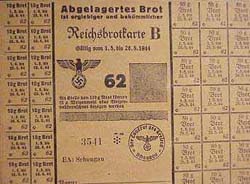 |
[ZAWiW] [gemeinsamlernen] [LiLL] | ||
|
|
|
|
| home | ||
|
|
Introduction | |
|
|
Questionnaire | |
|
|
Result Analysis | |
 |
||
Result Analysis
Stand:a: How did you treat (view) bread during the different periods of your life?
b: Has it always been easy for you to get bread?
Many people asked can remember a shortage of bread during and after the war. The rule was to treat bread carefully. It was not allowed to waste bread, dry bread was used for other purposes.
East Germany had a longer shortage of bread than the West, where after the monetary reform (1948) food was available in necessary quantities.
| Therefore, different age group experienced the shortage
of bread in many different ways. Bread was not allowed to be thrown away. Likewise scraps of bread and hard bread was eaten in other various forms ( i.e. as soup). Although they are not so strict today about throwing bread away, it is still "tabu" nowadays for older people to do so. With farm workers it was usual and desirable that they received part of their wages in the form of grain (see also Food exchanges). One person reported that bread had been used as a punishment for children, although it was effective the interviewer thought this method was questionable. |
 |
| City children suffered from hunger because of the distribution of the food rations was not enough for growing children. | Brotkarte im 2. Weltkrieg, DBM |
Quotations:
A 61-year-old woman said, "I will always be careful with bread, because of the shortage in my childhood, bread was only available with food rations. No crump was lost. I still have a great respect for bread. Deep in my soul I suffer when I see bread being thrown away, I even chastize people when I see them doing so. At that time only few people had enough bread".
c: Do you remember stories or have you yourself lived
in a period of time when there was a shortage of bread?
A large proportion of the 61-91 age group has themselves experienced a shortage
of bread during and after wartime. Most of the 90 age group have experienced WWI.
Quotations:
A 71 year old man: " As a prisoner in Russia I
suffered from a large shortage of bread. It was portioned out and we exchanged
tobacco for bread."
A 65 year old and a 69 year old from Silesia: "We got and extra ration of
bread for helping the farmers. Instead of payment we got grain which we brought
to the mill to exchange for flour.
A man from Croatia: " I was brought up on a farm but because of the communist regime my grandfather had to give up the wheat. Every now and then he succeeded in pocketing a small amount of wheat to bake white bread, especially for his grandchildren. "
A 67-year-old East German: " In my childhood there
was a big shortage of food, especially bread. I was often hungry for many years
because there was not enough to eat.
Summary:
For most of the people the shortage of bread in childhood
and youth was an intensive
(psychological and physiological) experience.
